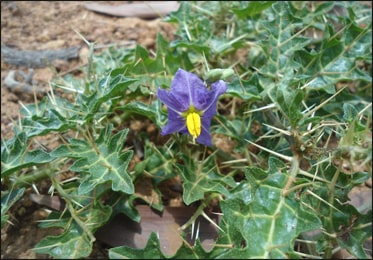
What is Kantakari?
Kantakari is a very important medicinal plant used in Ayurveda. It comes under Laghu panchmoola. It is useful in treating cold, cough, asthma and other respiratory conditions. Its botanical name is Solanum xanthocaprum / Solanum surattense / Solanum virginianum and it belongs to family Solanaceae.
Names in Different Languages
- English name: Febrifuge plant, Wild eggplant, Yellow-berried nightshade
- Hindi name: Ringani, katali, katai
- Punjabi name: Kandiyari
- Tamil name: Kantankattiri
- Bengali name: Kanitkari
- Kannad name: Nelagulle
- Gujarati name: Bhoringni
- Telgu name: Callamulag
- Marathi name: Bhui ringani
- Arabian name: Badajan Barri
- Malayalam name: Kantankattiti, Kantakariccunta
Sanskrit Synonyms:
- Vyaghri, Nidigdhika
- Kshudra, Kantakari
- Duhsparsha
Systemic Classification
- Botanical Name – Solanum xanthocarpum, Solanum virginianum, Solanum surattense Burm. f.
- Family – Solanaceae
- Genus – Solanum
- Species – S.virginianum, xanthocarpum, surattense
Description
Kantakari is a perennial herb with bluish-purple colored flowers. The root of this herb is cylindrical and is 10-45 cm long with small rootlets. The stem is green with young branches and is covered with numerous hair. Stems are 8 to 10mm thick of variable length. Their external surface is light green and when it is dry their surface is yellowish green. Leaves are elliptical in shape, with 4 to 12.5 cm length and 2 to 7.5 cm wide. Flowers are bright blue or bluish-purple in color, hairy and are 0.5 to 1.3 cm in length. Fruit is 0.8 to 1 cm in diameter and is globular in shape. The ripe fruit is yellowish in color with a white shade and unripe fruit is variegated with green and white colored strips. Seeds are flat and circular in shape with 0.2cm in diameter and are bitter in taste.
Habitat
It is native to Haryana, Gujarat, Madhya Pradesh and Rajasthan, found commonly on roadsides and wastelands.
Part used
Whole Plant, Fresh or Dried.
What are the Medicinal Properties of Kantakari?
- Rasa (taste): Tikta (Bitter), Katu (Pungent)
- Guna (Qualities): Rooksha (Dry), Teekshna (Piercing) and Laghu (Light)
- Veerya (Potency): Ushna (Hot)
- Vipaka: Katu (It undergoes pungent taste after digestion)
- Effect on Tridosha (Action): Balances Vata and Kapha doshas and also increases Pitta Dosha.
What are the Medicinal Uses of Kantakari?
- Kantakari is very effective in respiratory disorders such as asthma and cough.
- This herb is useful in treating urinary and stomach disorders.
- It is helpful for gum problems and sore throat.
- It is also beneficial in muscular pains, fever, gonorrhea, cardiac diseases, and liver disorders.
- Kantakari also treats acidity and constipation.
What are the Therapeutic Uses of Kantakari?
Cough and Asthma
In cough, Kantakari acts as an antitussive that reduces the cough reflex and expectorant that helps to thin mucus and decreases its production. This herb clear the airways and maintains the proper functioning of the lungs.
In Asthma, This herb dilates the bronchioles and decreases the swelling and formation of mucus. It prevents sinusitis, common cold, and other upper respiratory allergies.
Urinary Disorders
Kantakari acts as a diuretic that increases the amount of salt and water expelled from the body through urine. This herb lowers the blood pressure by flushing out salt from the body. It also acts as an antibiotic that stops the growth of bacteria. It also treats symptoms related to urinary tract infection such as burning micturition, excessive or no micturition, backache, vomiting, weakness etc.
Liver disorders
Kantakari has a hepatoprotective activity and acts as an antioxidant that inhibits the oxidation process by preventing the damage of cells caused by free radicals. This herb also regenerates the new cells and maintains the proper functioning of the liver. It also increases the metabolism of the liver.
Acidity
Kantakari acts as an antacid that neutralizes the acidic content and decreases its production. This herb provides quick relief in acid reflux (it is a condition in which acid content is pushed into the esophagus). It provides relief in symptoms related to acidity such as heartburn, constipation, pain in the abdomen, flatulence etc.
Insect bite
Kantakari acts as a pain killer that counteracts the pain. This herb also has an antibiotic property that kills the microbes and also acts as an antihistamine that reduces the allergic reaction. It also relieves pain and inflammation and reduces fever.
Gum problems
This herb acts as an antibiotic that reduces plaque and kills the bacteria that builds up the plaque because plaque produces toxins that irritate the gum. Sometimes the gums get inflamed resulting in puffiness and bleeding. This herb helps the gums to reattach to the teeth and makes them strong as well as healthy.
Different preparations made by Kantakari
- Juice
- Powder
- Extract
- Tonic
Doses of these preparations
- Juice: 5 to 10 ml
- Powder: 3 to 6 gm
- Extract: 5 to 10 ml
- Tonic: 5 to 10 ml
